山东省肥城市安站中学八年级英语上册 Unit 9 When was he born Period 2导学案 人教新目标版
八年级英语unit 9 when was he born 人教版(新目标)知识精讲
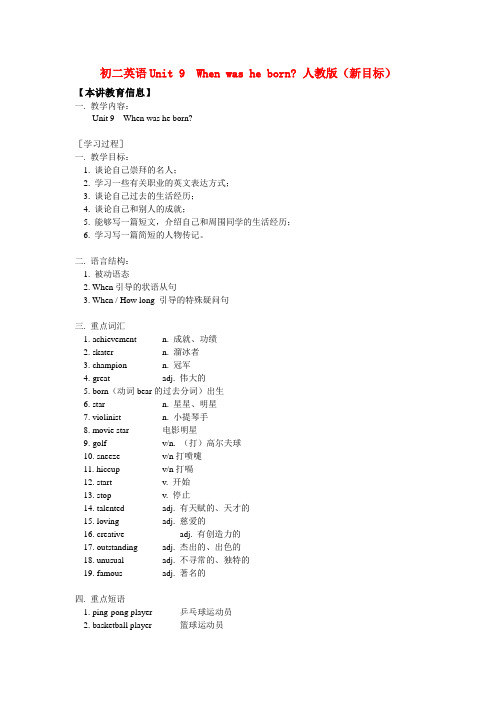
初二英语Unit 9 When was he born? 人教版(新目标)【本讲教育信息】一. 教学内容:Unit 9 When was he born?[学习过程]一. 教学目标:1. 谈论自己崇拜的名人;2. 学习一些有关职业的英文表达方式;3. 谈论自己过去的生活经历;4. 谈论自己和别人的成就;5. 能够写一篇短文,介绍自己和周围同学的生活经历;6. 学习写一篇简短的人物传记。
二. 语言结构:1. 被动语态2. When引导的状语从句3. When / How long 引导的特殊疑问句三. 重点词汇1. achievement n. 成就、功绩2. skater n. 溜冰者3. champion n. 冠军4. great adj. 伟大的5. born(动词bear的过去分词)出生6. star n. 星星、明星7. violinist n. 小提琴手8. movie star 电影明星9. golf v/n. (打)高尔夫球10. sneeze v/n打喷嚏11. hiccup v/n打嗝12. start v. 开始13. stop v. 停止14. talented adj. 有天赋的、天才的15. loving adj. 慈爱的16. creative adj. 有创造力的17. outstanding adj. 杰出的、出色的18. unusual adj. 不寻常的、独特的19. famous adj. 著名的四. 重点短语1. ping-pong player 乒乓球运动员2. basketball player 篮球运动员3. tennis player 网球手4. take part in 参加5. start doing / start to do 开始做…6. at the age of 在…岁时7. receive an honor 获得荣誉8. win the first prize 获得一等奖9. a piece of music 一段音乐10. a professional basketball player 一名职业篮球运动员五. 重点句子1. Who is that?那是谁?2. That’s Deng Yaping. She is a great ping-pong player.那是邓亚萍,她是一名伟大的乒乓球运动员。
Unit9Whenwasheborn?教案教学设计(人教版英语八年级)
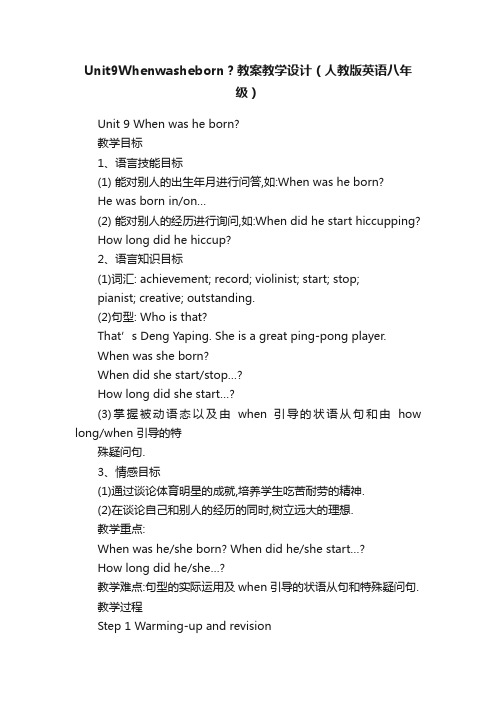
Unit9Whenwasheborn?教案教学设计(人教版英语八年级)Unit 9 When was he born?教学目标1、语言技能目标(1) 能对别人的出生年月进行问答,如:When was he born?He was born in/on…(2) 能对别人的经历进行询问,如:When did he start hiccupping?How long did he hiccup?2、语言知识目标(1)词汇: achievement; record; violinist; start; stop;pianist; creative; outstanding.(2)句型: Who is that?That’s Deng Yaping. She is a great ping-pong player.When was she born?When did she start/stop…?How long did she start…?(3)掌握被动语态以及由when 引导的状语从句和由how long/when 引导的特殊疑问句.3、情感目标(1)通过谈论体育明星的成就,培养学生吃苦耐劳的精神.(2)在谈论自己和别人的经历的同时,树立远大的理想.教学重点:When was he/she born? When did he/she start…?How long did he/she…?教学难点:句型的实际运用及when引导的状语从句和特殊疑问句.教学过程Step 1 Warming-up and revision(1) Intercourse(2) A guessing gameGet the students to review how to describe the famous people.T:. Let’s play a guessing game. I will tell you something abouta famous woman. Please listen to me carefully, and try to guess who sheis. She is Chinese. She was born in 1973.She plays ping-pong very well. She is short. She is very great.Do you know who she is ?S: Is she Deng Yaping ?T: Yes, you are right . Now please try to describe the famous personsStep 2 PresentationThis activity introduces the difficult points.A: When did Deng Yaping start playing ping-pong?B: She started playing ping-pong in 1978.A: When did she stop playing ping-pong?B: She stopped in 1997.A: How long did she play ping-pong?B: She played for 19 years.1、Ask the students to practice the sample conversation, then makeup similar conversations.2、 Ask several students to perform their conversations.3、Learning the new words.Step 3 Practice and listenNow we are going to talk about two unusual people.Look at this picture in section A 2a and the chart.T: What are their names ?S: The man is Charles Smith and the woman is Donna Green.T: What are they doing ?S: Charles Smith is hiccupping. Donna Green is sneezing.(Help them answer)T: What kinds of world record did they have ?S1: Charles Smith had a world record for hiccupping.S2: Donna Green had a world record for sneezing.T: How long did Charles Smith hiccup ?S3:He hiccupped for 69 years and 5 months.T: How long did Donna Green sneeze ?Let students listen to the tape and fill in the “How long” column inthe chart.Let students listen again and fill in the “started” and “stopped”columns.Get the students listen and write ,then check the answers.Step 4 DrillAsk some pairs of students to perform the conversations.T: You got all the answers right now. Let’s come to section A 2c pairwork. Please fill in the blanks with information from the listening.Ask two pairs of students to Practice the conversations.T: You did very well.I’d like you to work in pairs and make the same kind of conversationabout Donna.S1:How long did Charles Smith hiccup?S2:He hiccupped for 69 years and 5 months.S1:How long did he start hiccupping?S2:He started in 1922.S1:When did he stop hiccupping?S2:He stopped in 1990.Ask several pairs to act it out.Step 5 Sum-upThink about what we learn todayStep 6 Homework1)Write down a list of famous stars about their ages, birthdays, hobbiesand achievements2)Ask your parents birthdays and help them do something.板书设计:Unit 9 When was he born?He was born in/on…When did he start hiccupping? How long did he hiccup?Who is that?That’s Deng Yaping. She is a great ping-pong player.She started playing ping-pong in 1978.。
八年级英语上册 Unit 9 When was he born
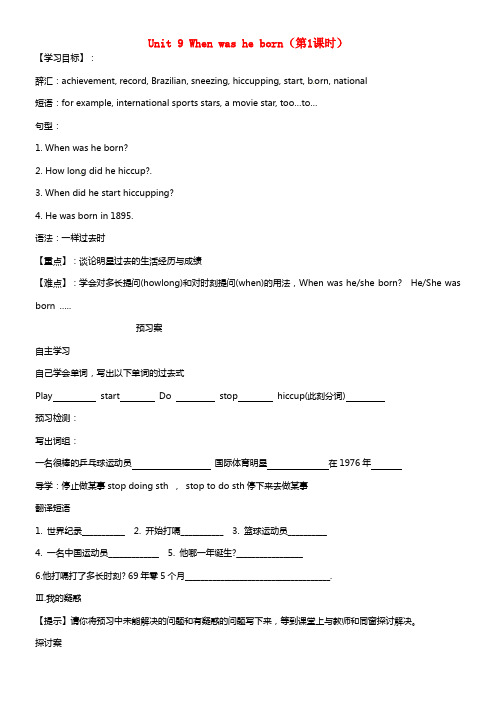
Unit 9 When was he born(第1课时)【学习目标】:辞汇:achievement, record, Brazilian, sneezing, hiccupping, start, b orn, national短语:for example, international sports stars, a movie star, too…to…句型:1. When was he born?2. How long did he hiccup?.3. When did he start hiccupping?4. He was born in 1895.语法:一样过去时【重点】:谈论明星过去的生活经历与成绩【难点】:学会对多长提问(howlong)和对时刻提问(when)的用法,When was he/she born? He/She was born …..预习案自主学习自己学会单词,写出以下单词的过去式Play start Do stop hiccup(此刻分词)预习检测:写出词组:一名很棒的乒乓球运动员国际体育明星在1976年导学:停止做某事stop doing sth ,stop to do sth停下来去做某事翻译短语1. 世界纪录___________2. 开始打嗝___________3. 篮球运动员__________4. 一名中国运动员_____________5. 他哪一年诞生?_________________6.他打嗝打了多长时刻? 69年零5个月_____________________________________.Ⅲ.我的疑惑【提示】请你将预习中未能解决的问题和有疑惑的问题写下来,等到课堂上与教师和同窗探讨解决。
探讨案Ⅰ.质疑探讨--- 质疑解疑、合作探讨Ⅱ.学贵有疑--- 我试探我收成【学习建议】通过以上学习,请你把尚存的疑问写下来,与同窗进一步探讨。
八年级英语上册 Unit 9 When was he born教材全梳理 人教新目标版

【英语】八年级上册教材全梳理(Unit 9 When was he born)知识•巧学•升华巧解生词【词析】音析:ear读。
形析:b+ear(耳朵)【例句】 She was born in China.他出生在中国。
【拓展】(1)过去分词:born(2)短语:be born in(on)出生于; be born in one's mind 牢记在心It must be born in your mind that you are a Chinese.你必须牢记在心,你是一个中国人。
【词析】音析:or读形析:re + cord(绳索、束缚)【例句】 Jim has the hiccuppingworld record. 吉姆保持着打嗝的世界记录。
【拓展】(1)同根词:recorder n.录音机(2)短语:keep the record保持记录;break the record打破记录【词析】音析:第一个元音字母a读。
形析:nation(国家)+-al(形容词后缀)【例句】 We refuse to sign any treaty that is against our national interests. 我们拒绝签署任何有损国家利益的协议。
【拓展】(1)同根词:nationalism 民族主义(2)短语:national anthem 国歌【词析】音析:o读。
形析:be(是)+e(来)【例句】 He hopes to bee an engineer when he grows up.他希望长大后当一名工程师。
【拓展】(1)过去式:became(2)短语:bee interested in 对……感兴趣如:Most children bee interestedin puter games.大多数的孩子对电脑游戏感兴趣。
【词析】音析:元音字母a读。
形析:c+all(所有的)【例句】 You can call me Matthew. 你可以叫我马太。
八年级英语unit 9 when was he born知识精讲
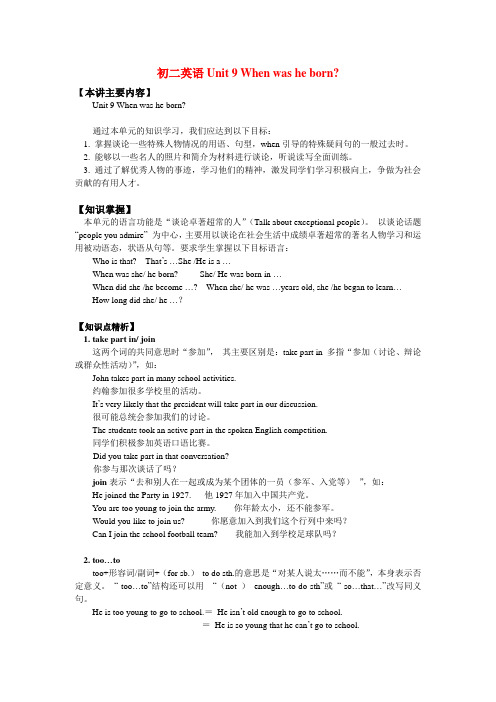
初二英语Unit 9 When was he born?【本讲主要内容】Unit 9 When was he born?通过本单元的知识学习,我们应达到以下目标:1. 掌握谈论一些特殊人物情况的用语、句型,when引导的特殊疑问句的一般过去时。
2. 能够以一些名人的照片和简介为材料进行谈论,听说读写全面训练。
3. 通过了解优秀人物的事迹,学习他们的精神,激发同学们学习积极向上,争做为社会贡献的有用人才。
【知识掌握】本单元的语言功能是“谈论卓著超常的人”(Talk about exceptional people)。
以谈论话题“people you admire”为中心,主要用以谈论在社会生活中成绩卓著超常的著名人物学习和运用被动语态,状语从句等。
要求学生掌握以下目标语言:Who is that? That’s …She /He is a …When was she/ he born? She/ He was born in …When did she /he become …? When she/ he was …years old, she /he began to learn…How long did she/ he …?【知识点精析】1. take part in/ join这两个词的共同意思时“参加”,其主要区别是:take part in 多指“参加(讨论、辩论或群众性活动)”,如:John takes part in many school activities.约翰参加很多学校里的活动。
It’s very likely that the president will take part in our discussion.很可能总统会参加我们的讨论。
The students took an active part in the spoken English competition.同学们积极参加英语口语比赛。
八年级英语上unit9 When was he born

17 years old
Task 2 Write an article to introduce yourself.
My name is Tom. I was born in 1980. When I was six years old, I went to school. I loved drawing very much. So when I was seven, I started learning drawing. When I was eleven years old, I went to Middle School. I loved English very much. So I became an English teacher.
Unit 9 When was he born?
Language goal:
Talk about famous people
Teaching Importance:
1.too…to… 2. start doing sth….
A
B
C
Task 1 Make the conversation
Pictures Name Job
Name Tiger Woods Shirley Temple Mozart
Mei Lanfang Ronaldo
Job
Achievement Age
golfer
golfing
10 months old
movie star making movie 3 years old musician writing music 4 years old
Birthday How
started
long Zhang table tennis Yining player
山东省肥城市安站中学八年级英语上册 Unit 9 When was he born Period 3导学案 人教新目标版
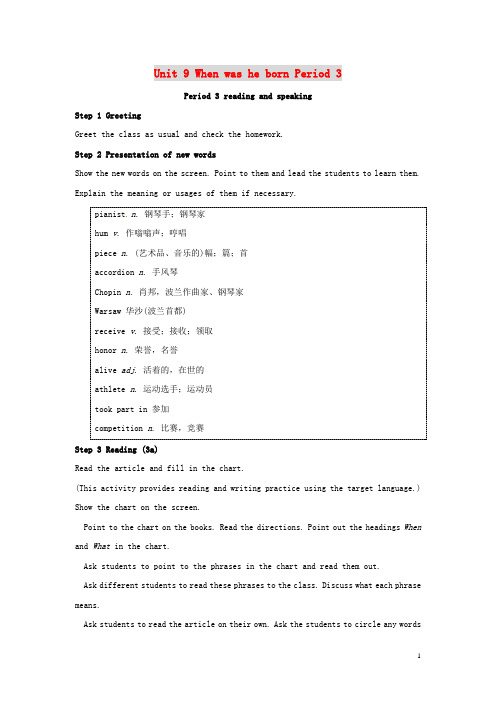
Unit 9 When was he born Period 3Period 3 reading and speakingStep 1 GreetingGreet the class as usual and check the homework.Step 2 Presentation of new wordsShow the new words on the screen. Point to them and lead the students to learn them. Explain the meaning or usages of them if necessary.pianist n.钢琴手;钢琴家hum v.作嗡嗡声;哼唱piece n. (艺术品、音乐的)幅;篇;首accordion n.手风琴Chopin n.肖邦,波兰作曲家、钢琴家Warsaw 华沙(波兰首都)receive v.接受;接收;领取honor n.荣誉,名誉alive adj.活着的,在世的athlete n.运动选手;运动员took part in 参加competition n.比赛,竞赛Step 3 Reading (3a)Read the article and fill in the chart.(This activity provides reading and writing practice using the target language.) Show the chart on the screen.Point to the chart on the books. Read the directions. Point out the headings When and What in the chart.Ask students to point to the phrases in the chart and read them out.Ask different students to read these phrases to the class. Discuss what each phrase means.Ask students to read the article on their own. Ask the students to circle any wordsor phrases they don't understand.Ask students to read to you any words or phrases they circled. Write these items on the board and ask other students to explain what they mean. They can use the word in a different sentence, point to a picture in the book ,or draw a simple picture on the board, for example.Then ask students to read the article again and fill in the information in the chart.Correct the answers.Step 4 Writing (3b)Look at the information in Activity 2b.Write and article about Laura.(This activity provides guided writin g practice using the target langua ge.) Read the instructions and ask students to look at the examples. Read the sample. Ask the students to use these sentences to start their articles. Remind the students to look back at Activity 2b for the information they need.Ask students to use the article about Midori as an example.Step 5 Practice writing (3c)Write about a person you admire.(This activity provides writing practice using the target language.)Read the instructions and ask students who they might write about. Make a list of these names on the board. Ask students to make some statements they can use in their articles and write these on the blackboard.Ask students to work on their own. When they fin ish, ask the students to read the article to a partner and to talk about the person in the article.Winner's Gallery (This may explain first at class and ask students to do later after class. They coul d choose other topic like Movie Stars' Gallery or Music Stars' Gallery, etc.)Ask students to create their own Winner's Ga llery. Explain that this is a series of pictures and statements about very special people. Students draw or bring in a picture of the person. Then they write a few sen tence s about why the person is special,attach the writing to the picture, and display the words and pictures on a bulletin board in the classroom. They can write about a sports figure, a family member or any other special person they wish. Encourage them to use color pens in their work. Step 6 Groupwork: Ten Questions (4)Your classmates have to guess the name of a person you admire. They can ask you ten questions.(This activity provides listening, speaking, reading, and writing practice using the target language.)Ask students to work in groups of four.Help students make groups.Read the instructions to the class. Say, Three students in the group will ask questions. The fourth student will answer the questions about the person in his or her article.Point out the sample conversation. Ask three students to read it to the class.A: Is the person a man or a woman?B: He is man.C: Is he alive?B: No, he isn't.D: Was he an athlete?B: No, he wasn't.Then ask students to work with their groups. As they work, move around the room monitoring progress.Step 7 Self-check1. Fill in the blanks.2. Write an article.Step 8 SummaryToday we have learned the story about Li Yundi, the famous Chinese pianist. From his story we know t he expressions of when and what about him. And also we learned that interests are the mother of success. To learn a course well, build the interest first.Step 9 HomeworkWrite a short story about a person you admire.。
八年级英语unit 9 when was he born知识精讲

初二英语Unit 9 When was he born?【本讲主要内容】Unit 9 When was he born?通过本单元的知识学习,我们应达到以下目标:1. 掌握谈论一些特殊人物情况的用语、句型,when引导的特殊疑问句的一般过去时。
2. 能够以一些名人的照片和简介为材料进行谈论,听说读写全面训练。
3. 通过了解优秀人物的事迹,学习他们的精神,激发同学们学习积极向上,争做为社会贡献的有用人才。
【知识掌握】本单元的语言功能是“谈论卓著超常的人”(Talk about exceptional people)。
以谈论话题“people you admire”为中心,主要用以谈论在社会生活中成绩卓著超常的著名人物学习和运用被动语态,状语从句等。
要求学生掌握以下目标语言:Who is that? That’s …She /He is a …When was she/ he born? She/ He was born in …When did she /he become …? When she/ he was …years old, she /he began to learn…How long did she/ he …?【知识点精析】1. take part in/ join这两个词的共同意思时“参加”,其主要区别是:take part in 多指“参加(讨论、辩论或群众性活动)”,如:John takes part in many school activities.约翰参加很多学校里的活动。
It’s very likely that the president will take part in our discussion.很可能总统会参加我们的讨论。
The students took an active part in the spoken English competition.同学们积极参加英语口语比赛。
八年级英语上Unit 9 When was he born
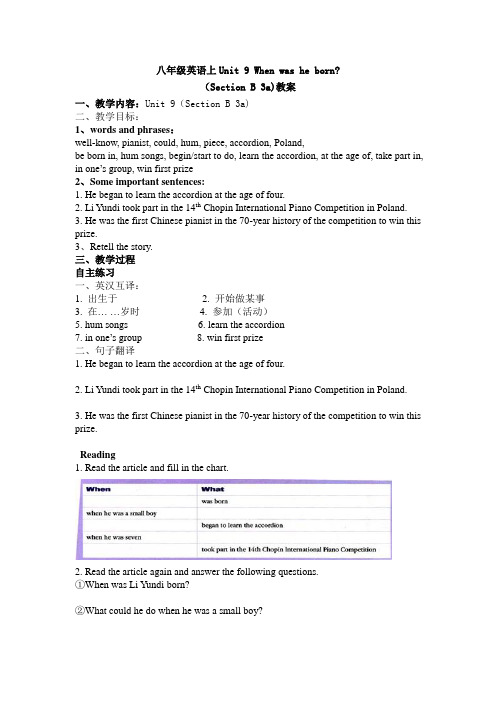
八年级英语上Unit 9 When was he born?(Section B 3a)教案一、教学内容:Unit 9(Section B 3a)二、教学目标:1、words and phrases:well-know, pianist, could, hum, piece, accordion, Poland,be born in, hum songs, begin/start to do, learn the accordion, at the age of, take part in, in one’s group, win first prize2、Some important sentences:1. He began to learn the accordion at the age of four.2. Li Yundi took part in the 14th Chopin International Piano Competition in Poland.3. He was the first Chinese pianist in the 70-year history of the competition to win this prize.3、Retell the story.三、教学过程自主练习一、英汉互译:1. 出生于_________2. 开始做某事______3. 在……岁时______4. 参加(活动)______5. hum songs _________6. learn the accordion______7. in one’s group______ 8. win first prize______二、句子翻译1. He began to learn the accordion at the age of four._________________________________________2. Li Yundi took part in the 14th Chopin International Piano Competition in Poland._________________________________________3. He was the first Chinese pianist in the 70-year history of the competition to win this prize._________________________________________Reading1. Read the article and fill in the chart.2. Read the article again and answer the following questions.①When was Li Yundi born?_________________________________________②What could he do when he was a small boy?_________________________________________③When did he begin to learn the accordion?_________________________________________④What did he do when he was seven?_________________________________________⑤When did he take part in the 14th Chopin International Piano Competition? _________________________________________3. Finish the article without looking at it.(见助学P83四)(助学P84-P85翻译探究部分四到六)当堂检测一、根据首字母或汉语提示写单词。
八年级上册英语Unit9《When was he born》知识点

八年级上册英语Unit9《When was he born》知识点整理【应掌握的词组】1. ping-pong player 乒乓球运动员2. a great Chinese ping-pong player 中国杰出的乒乓球运动员3. start hiccupping 开始打嗝4. too… to…太……而不……5. write music 谱写曲子6. a movie star 电影明星7. learn to ride a bicycle 学骑自行车8. start learning English 开始学英语9. begin playing sports 开始体育运动 10. a loving grandfather 慈爱的祖父11. spend all one's free time with sb. 与某人一起度过了所有的业余时间 12. a famous violinist 著名的小提琴手13. ice skating 滑冰 14. a kind and loving grandmother 和蔼而慈爱的祖母15. a skating champion 滑冰冠军 16. the famous Chinese pianist 中国著名的钢琴演奏家17. a small boy(girl)孩提时期18. at the age of…在……年龄时19. take part in 参加、加入20. begin to learn the accordion 开始学习手风琴21. major in 主修,专修22. start for a place=leave for a place 动身去… 23. because of 因为、由于【应掌握的句子】1.When was he born? 他是什么时候出生的?2.Who's that? That's Deng Yaping. She is a great Chinese ping-pong player.那是谁?是邓亚萍。
山东省肥城市安站中学八年级英语上册 Unit 9 When was he born Period 1
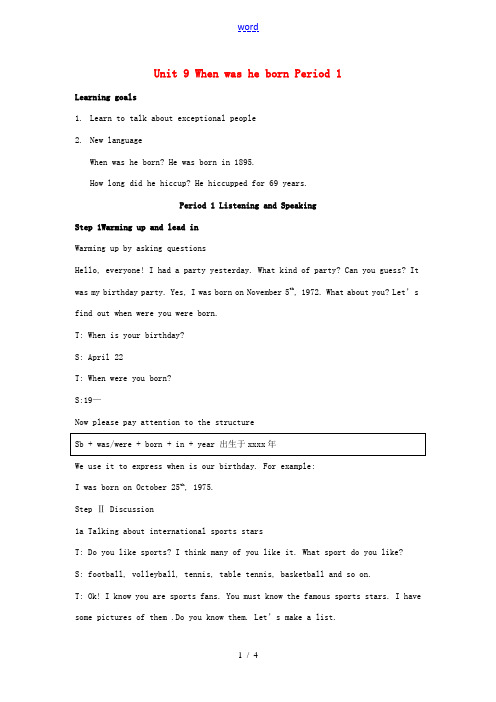
Unit 9 When was he born Period 1Learning goals1.Learn to talk about exceptional people2.New languageWhen was he born? He was born in 1895.How long did he hiccup? He hiccupped for 69 years.Period 1 Listening and SpeakingStep 1Warming up and lead inWarming up by asking questionsHello, everyone! I had a party yesterday. What kind of party? Can you guess? It was my birthday party. Yes, I was born on November 5th, 1972. What about you? Let’s find out when were you were born.T: When is your birthday?S: April 22T: When were you born?S:19—Now please pay attention to the structureWe use it to express when is our birthday. For example:I was born on October 25th, 1975.Step Ⅱ Discussion1a Talking about international sports starsT: Do you like sports? I think many of you like it. What sport do you like? S: football, volleyball, tennis, table tennis, basketball and so on.T: Ok! I know you are sports fans. You must know the famous sports stars. I have some pictu res of them .Do you know them. Let’s make a list.Pleasethink about these questions. What sport does he or she play? Do you like him or her? Why or why not?Step 2 Listening and speaking1. Listen to the tape and write the year when the sports star were bor n. I will play it twice. First time you can only listen and the second time you can write.2. Check the answers by making conversations like this:Who ’s that?She ’s Dend Yaping?When was she born?She was born in 1970.Read the tapescript and try to underline the expressions and shadow the when/how long questions3. PairworkFirst let’s look at the dialogue about Deng Yaping. Please read it after me. When you read please pay attention to the pronunciations and intonations.Now make the similar dialogue about other people with your partners. I’d like to ask some pair to act it out. For example:A: When was he born?B: He was born in 1963.Step 3 Listening1. Look at the pictures. What are they doing? Learn the new wordsHiccup 打嗝sneeze 打喷嚏world record means the best in theworldLet’s listen to the tape carefully and fill in the chart.While listening, try to get the important thing --- “how long”2. Listen again and fill in the “started”and “stopped” columns.Read the tapescript and try to underline the expressions and shadow the when/how long questions3. Filling the chart and speakingFirst let’s fill in the blank with the information from the chart in last part. Please practice the conversation with your partner.Make the same kind of conversation about Donna Gree n.The students’ conversation may be like this.A:How long did Donna Green sneezing?B: She sneezing for978 days.A:When did she start her sneezing?B: She started on January 13,1981.A:When did she stop sneezing?B: She stopped on September16, 1983.Grammar FocusPlease go over this part by yourselves. Put your questions to me if you have any.Please pay attention to the tense and the past forms of verbs. When we talk about t hings in the past, we should use the past tense. The past form of “be” is “was” or “were”. To the regular verbs, “ed” should be added after them. And as for the irregular verbs we should remember their past forms.Step 4Interviewing1. Boys and girls, let’s play a game, an interview.Look at the chart and interview you partners by asking the questio n.How old were you when…?2. Who would like to tell us his report about his interview?Step 5 SummaryToday we have learned another kind of exceptional people—Mr. Charles Smith who has a world record for hiccupping and Ms. Green who has a world record for sneezing. Keep on one goal you will succeed at last. Every day you practise, at last you will succeed someday. This is like the way you learn, days and days you keep working hard on it, you will collect your fruit someday like say, go to a famous university, and to be a famous professor or a scientist, or a succeeded businessman.Step 6 HomeworkPractise activities in Activity 2a and 2c.。
八年级英语上册 Unit 9(When was he born)教学设计 人教新目标版 教案
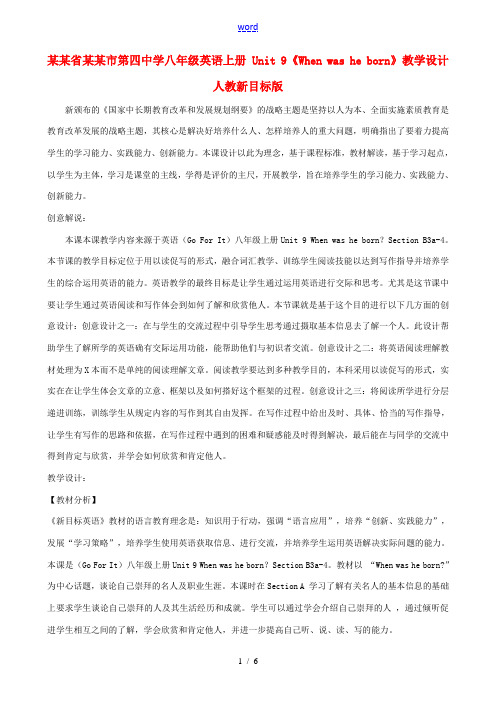
某某省某某市第四中学八年级英语上册 Unit 9《When was he born》教学设计人教新目标版新颁布的《国家中长期教育改革和发展规划纲要》的战略主题是坚持以人为本、全面实施素质教育是教育改革发展的战略主题,其核心是解决好培养什么人、怎样培养人的重大问题,明确指出了要着力提高学生的学习能力、实践能力、创新能力。
本课设计以此为理念,基于课程标准,教材解读,基于学习起点,以学生为主体,学习是课堂的主线,学得是评价的主尺,开展教学,旨在培养学生的学习能力、实践能力、创新能力。
创意解说:本课本课教学内容来源于英语(Go For It)八年级上册Unit 9 When was he born?Section B3a-4。
本节课的教学目标定位于用以读促写的形式,融合词汇教学、训练学生阅读技能以达到写作指导并培养学生的综合运用英语的能力。
英语教学的最终目标是让学生通过运用英语进行交际和思考。
尤其是这节课中要让学生通过英语阅读和写作体会到如何了解和欣赏他人。
本节课就是基于这个目的进行以下几方面的创意设计:创意设计之一:在与学生的交流过程中引导学生思考通过摄取基本信息去了解一个人。
此设计帮助学生了解所学的英语确有交际运用功能,能帮助他们与初识者交流。
创意设计之二:将英语阅读理解教材处理为X本而不是单纯的阅读理解文章。
阅读教学要达到多种教学目的,本科采用以读促写的形式,实实在在让学生体会文章的立意、框架以及如何搭好这个框架的过程。
创意设计之三:将阅读所学进行分层递进训练,训练学生从规定内容的写作到其自由发挥。
在写作过程中给出及时、具体、恰当的写作指导,让学生有写作的思路和依据,在写作过程中遇到的困难和疑惑能及时得到解决,最后能在与同学的交流中得到肯定与欣赏,并学会如何欣赏和肯定他人。
教学设计:【教材分析】《新目标英语》教材的语言教育理念是:知识用于行动,强调“语言应用”,培养“创新、实践能力”,发展“学习策略”,培养学生使用英语获取信息、进行交流,并培养学生运用英语解决实际问题的能力。
肥城市安站中学八年级英语 Unit 9 When was he born Period 2导学案 人教新目标版
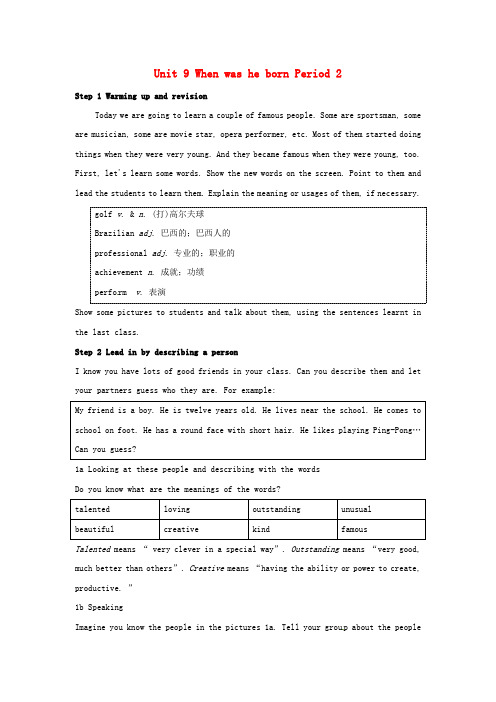
Unit 9 When was he born Period 2Step 1 Warming up and revisionToday we are going to learn a couple of famous people. Some are sportsman, some are musician, some are movie star, opera performer, etc. Most of them started doing things when they were very young. And they became famous when they were young, too. First, let's learn some words. Show the new words on the screen. Point to them and lead the students to learn them. Explain the meaning or usages of them, if necessary.golf v. & n. (打)高尔夫球Brazilian adj.巴西的;巴西人的professional adj.专业的;职业的achievement n.成就;功绩perfo rm v.表演Show some pictures to students and talk about them, using the sentences learnt in the last class.Step 2 Lead in by describing a personI know you have lots of good friends in your class. Can you describe them and let your partners guess who they are. For example:My friend is a boy. He is twelve years old. He lives near the school. He comes to school on foot. He has a round face with short hair. He likes playing Ping-Pong… Can you guess?1a Looking at these people and describing with the wordsDo you know what are the meanings of the words?talented loving outstanding unusualbeautiful creative kind famousTalented means “ very clever in a special way”. Outstanding means “very good, much better than others”.Creative means “having the ability or power to create, productive. ”1b SpeakingImagine you know the people in the pictures 1a. Tell your grou p about the peopleStep 3 listening and practice2a Listening and circling the wordsListen, two people are talking about people they admire. Please circle the words you hear.Now let’s check the answers2b Listening and writing “M” or “L” on the lines.Check the answers.2c Doing pairworkAsk and answer questions about Midori and Laura.You should practice these dialogues as much as possible.Step 4 Pairwork(This activity provides reading and writing practice using the target language.)Read the directions.Your are never too young to start doing things. For example. Tiger Woods started golfing when he was only ten monthsold.Mozart started writing music when he was four years old. And Pele, the great Brazilian soccer player, became a professional soccer star when he was fifteen. Ask students to point to the names in the chart below the article. Read the names to the class.Point out the headings in the chart. Ask students what they think the word achievement means. Explain that it means the important thing each person did.Point out the sample answer in the chart. Divide the class into two groups—A and B. Ask each student A to look at the pictures and paragraph on page 55. Ask each student B to look at the pictures and paragraph on page 93. Remind students not to look at the other page.Have students continue filling in their own charts, on their own. Move around the room monitoring students', progress and offering help as needed.Step 5 Writing (3b)Now exchange information with your partner and fill in the chart.(This activity provides listening, speaking, reading, and writing practice using the target language.)When all students hav e finished reading and filling in their answers, ask the students to work in pairs.Point out the sample conversation and ask two students to read it to the class.A: Who is Shirley Temple?B: She's a movie star.A: When did she become a movie star?B: When she was three years old.Then ask students to work in pairs.Studen t A asks questions to get the information he or she needs to complete the chart. Then student B asks for his or her missing information. Both students complete all sections of their charts.Draw the chart on the blackboard. Ask the students who finish first to write the answers in the chart.Correct the answers in the chart.Step 6 Interview (4a)How old were you when you started doing the things below? Interview your classmat es and fill in the chart.(This activity provides listening, speaking, reading, and writing practiceusing the target language.)Point out the chart and read the instructions to the class.Write this sample question on the blackboard: When did you learn to ride a bicycle? Then ask two students to ask and answer these questions. The first student can ask the question. The sec ond student can tell his or her age when he or she learne d to ride a bicycle.Say, Now stand up and move around the room. Talk to several other students. Ask a different student about each thing in the chart. Write the students' names and their answers in the chart.Ask students talk to each other, move around the room checking their progress. Step 7 Class SurveyAsk a group of students to make a list of four or five things they learned how to do when they were little children. For example, learned to ride a bicycle, learned to read, learned to whistle, and so forth. Then ask each student in the group to talk to other students in the class and write down when they learned to do each thing. When they have finished , ask the group to tell the class what they learned.For example,Nine students in the class learned to ride a bicycle when they were seven. Three students were eight. One student was ten.Step 8 SummaryToday we have talked about some famous people. They all start th eir doing when they were very young. And finally they have made great success. But that is based on their years of hard work. Even to us they are still good examples. Whenever we study or do something other field, you are never too young to start doing things , or you are never too old to start doi ng things. From now on, s tart your own doings like making up English learning or other courses, you will success. Only remember, no pains, no gains.Step 9 HomeworkPractise describing people as in Activity 3a and 4a.Practise words we learned in the first three periods.。
八年级上册 单词巧记+句型语法剖析(Unit 9 When was he born)

八年级上册单词巧记+句型语法剖析Unit 9When was he born三点剖析单词·巧记·典句·考点national []adj. 国家的;全国的【巧记提示】nation(国家)+al(形容词后缀)【经典例句】Yang liwei becomes the national hero.杨利伟成了民族英雄。
【考点聚焦】1)同根词:nationalism 民族主义2)短语:national anthem 国歌become []v.成为;变成【巧记提示】be(是)+come(来)【经典例句】He hopes to become an engineer when he grows up.他希望长大后当一名工程师。
【考点聚焦】1)become 后面可加名词、形容词,表示“成为……”。
如:I want to become a teacher.我想成为一名教师。
2)短语:became interest in 对……感兴趣【活学活用】1.选择When did she a movie star?A.becameB.becomeC.isD.was答案:Bcall []v. 把……叫做;称呼;为……取名【巧记提示】c+all(所有的)【经典例句】You can call me Matthew.你可以叫我马太。
【考点聚焦】1) call后面加双宾语。
2)常见的短语:call at 访问(某地);call for 要求,号召;call on 拜访3)call还有“打电话”的意思。
如:Please call me when you come back.当你返回来的时候,给我打电话。
【活学活用】2.选择This is Tiger Woods,you can Woods.A.call himB.call heC.call for himD.call on him答案:Apiece []n. (艺术品、音乐的)幅;篇;首【经典例句】What a beautiful piece of music!多好听的一首曲子啊!【考点聚焦】1)a piece of+不可数名词如:a piece of cloth 一块布;a piece of wood 一块木头2)在修饰后面的名词时,常把形容词放在piece的前面。
八年级英语上册 unit 9 when was he born知识点总结 人教新目标版
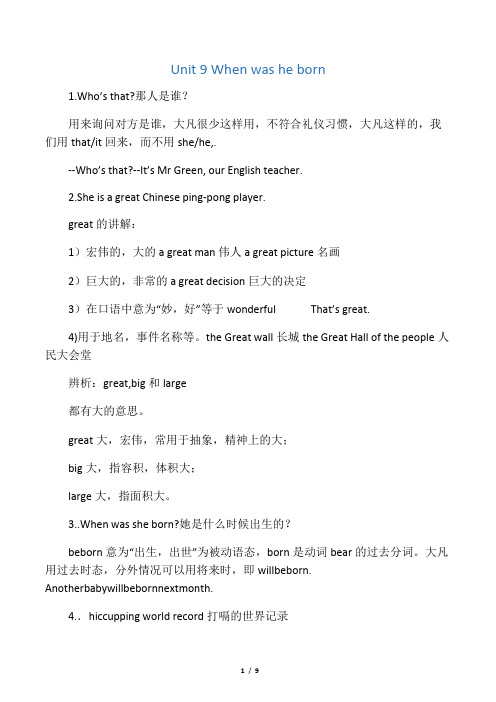
Unit 9 When was he born1.Who’s that?那人是谁?用来询问对方是谁,大凡很少这样用,不符合礼仪习惯,大凡这样的,我们用that/it回来,而不用she/he,.--Who’s that?--It’s Mr Green, our English teacher.2.She is a great Chinese ping-pong player.great的讲解:1)宏伟的,大的a great man伟人a great picture名画2)巨大的,非常的a great decision巨大的决定3)在口语中意为“妙,好”等于wonderful That’s great.4)用于地名,事件名称等。
the Great wall长城the Great Hall of the people人民大会堂辨析:great,big和large都有大的意思。
great大,宏伟,常用于抽象,精神上的大;big大,指容积,体积大;large大,指面积大。
3..When was she born?她是什么时候出生的?beborn意为“出生,出世”为被动语态,born是动词bear的过去分词。
大凡用过去时态,分外情况可以用将来时,即willbeborn. Anotherbabywillbebornnextmonth.4..hiccupping world record打嗝的世界记录1)world records世界记录2)①record n.记录,记载break the record打破记录②record v.记载,记录The programme was recorded.5.When did he start hiccupping?你什么时候开始打嗝的?1)start出发起程We must start early.2)start开始着手start work着手工作辨析:start与begin两者都有“开始”的意思①start动作性较强,留意于开始或着手这一点,带有“突然开始”的意思Let’s start to do it at once.②begin指开始某一行动或进程。
八年级英语上册 Unit 9 When was he born_ Section B导学案人教新目标版

Unit 9 When was he born?Section A1a-2c 导学案一.[课前检测]1.Read the new words on Page 53-54.2. Translate the words and phrases.翻译下列单词短语1.出生_______2、什么时间_________3、中国的__________4、金的___________5.奖牌______6、足球运动员________7、变成________8.篮球运动员______3.Match the people with their professions(职业).把人物和职业匹配()1.Deng Yaping a. a soccer player()2.Michael Jordan b. a ping-pong player()3.Martina Hingis c. a basketball player()4.David Beckham d. a tennis player二.[学习目标] 1、学会并熟练应用本课单词和短语。
2. 掌握出生日期和职业的表达方式并能谈论名人的出生日期和职业。
三.[学习过程]1. 导入新课:明星俱乐部姚明图片:-Who’s that ? -- He is .–What is he ? -- He is a ……–Where is he from ? -- He is from ______.--When was he born?-- He was born in 1980(年) / in September(月)/on September 30th ,1980.(一)小组活动:展示名人图片,完成1a, 问答以下问题。
(姓名、出生年月、职业)自主学习------4人小组问答(二)点拨提高:时间名词前所用介词的速记歌:年月周前要用in,日子前面却不行。
遇到几号要用on,上午下午又是in。
八年级英语上册 Unit 9《When was he born》学案 人教新目标版
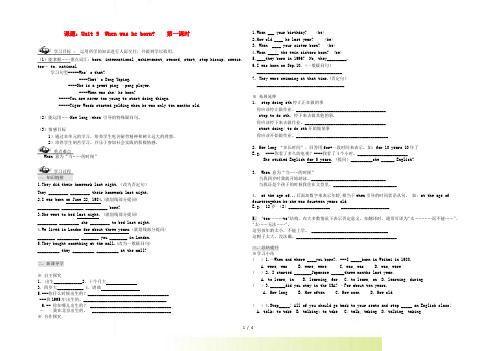
课题:Unit 5 When was he born? 第一课时学习目标:运用所学的知识进行人际交往,并做到学以致用。
(1)能掌握……重点词汇:born,international ,achievement, record, start, stop hiccup,sneeze,too… to,national学习句型-----Who’s that?----That’s Deng Yaping.----She is a great ping –pong player.----When was she/ he born?-----You are never too young to start doing things.-----Tiger Woods started golfing when he was only ten months old.(2)能运用……How long /when 引导的特殊疑问句。
(3)情感目标1)通过本单元的学习,培养学生吃苦耐劳精神和树立远大的理想。
重点难点学习过程一、知识链接1.They did their homework last night.(改为否定句)They _________ _________ their homework last night.2.I was born on June 22, 1984.(就划线部分提问)__________ __________ __________ born?3.She went to bed last night. (就划线部分提问)_________ _________ she _________ to bed last night.4.We lived in London for about three years.(就划线部分提问)________ __________ ________ you ________ in London.5.They bought something at the mall.(改为一般疑问句)__________ they __________ __________ at the mall?二、新课导学※ 自主探究1、出生_____________2、十个月大3. 四岁大____________ 4、谱曲5.---你什么时候出生的?_____________________________________---我1995年出生的。
- 1、下载文档前请自行甄别文档内容的完整性,平台不提供额外的编辑、内容补充、找答案等附加服务。
- 2、"仅部分预览"的文档,不可在线预览部分如存在完整性等问题,可反馈申请退款(可完整预览的文档不适用该条件!)。
- 3、如文档侵犯您的权益,请联系客服反馈,我们会尽快为您处理(人工客服工作时间:9:00-18:30)。
Unit 9 When was he born Period 2Step 1 Warming up and revisionToday we are going to learn a couple of famous people. Some are sportsman, some are musician, some are movie star, opera performer, etc. Most of them started doing things when they were very young. And they became famous when they were young, too. First, let's learn some words. Show the new words on the screen. Point to them and lead the students to learn them. Explain the meaning or usages of them, if necessary.golf v. & n. (打)高尔夫球Brazilian adj.巴西的;巴西人的professional adj.专业的;职业的achievement n.成就;功绩perform v.表演Show some pictures to students and talk about them, using the sentences learnt in the last class.Step 2 Lead in by describing a personI know you have lots of good friends in your class. Can you describe them and let your partners guess who they are. For example:My friend is a boy. He is twelve years old. He lives near the school. He comes to school on foot. He has a round face with short hair. He likes playing Ping-Pong… Can you guess?1a Looking at these people and describing with the wordsDo you know what are the meanings of the words?talented loving outstanding unusualbeautiful creative kind famousTalented means “ very clever in a special way”. Outstanding means “very good, much better than others”.Creative means “having the ability or power to create, productive. ”1b SpeakingImagine you know the people in the pictures 1a. Tell your group about the peopleStep 3 listening and practice2a Listening and circling the wordsListen, two people are talking about people they admire. Please circle the words you hear.Now let’s check the answers2b Li stening and writing “M” or “L” on the lines.Check the answers.2c Doing pairworkAsk and answer questions about Midori and Laura.You should practice these dialogues as much as possible.Step 4 Pairwork(This activity provides reading and writing practice using the target language.)Read the directions.Your are never too young to start doing things. For example. Tiger Woods started golfing when he was only ten monthsold.Mozart started writing music when he was four years old. And Pele, the great Brazilian soccer player, became a professional soccer star when he was fifteen. Ask students to point to the names in the chart below the article. Read the names to the class.Point out the headings in the chart. Ask students what they think the word achievement means. Explain that it means the important thing each person did.Point out the sample answer in the chart. Divide the class into two groups—A and B. Ask each student A to look at the pictures and paragraph on page 55. Ask each student B to look at the pictures and paragraph on page 93. Remind students not to look at the other page.Have students continue filling in their own charts, on their own. Move around the room monitoring students', progress and offering help as needed.Step 5 Writing (3b)Now exchange information with your partner and fill in the chart.(This activity provides listening, speaking, reading, and writing practice using the target language.)When all students have finished reading and filling in their answers, ask the students to work in pairs.Point out the sample conversation and ask two students to read it to the class.A: Who is Shirley Temple?B: She's a movie star.A: When did she become a movie star?B: When she was three years old.Then ask students to work in pairs.Student A asks questions to get the information he or she needs to complete the chart. Then student B asks for his or her missing information. Both students complete all sections of their charts.Draw the chart on the blackboard. Ask the students who finish first to write the answers in the chart.Correct the answers in the chart.Step 6 Interview (4a)How old were you when you started doing the things below? Interview your classmates and fill in the chart.(This activity provides listening, speaking, reading, and writing practiceusing the target language.)Point out the chart and read the instructions to the class.Write this sample question on the blackboard: When did you learn to ride a bicycle? Then ask two students to ask and answer these questions. The first student can ask the question. The second student can tell his or her age when he or she learned to ride a bicycle.Say, Now stand up and move around the room. Talk to several other students. Ask a different student about each thing in the chart. Write the students' names and their answers in the chart.Ask students talk to each other, move around the room checking their progress. Step 7 Class SurveyAsk a group of students to make a list of four or five things they learned how to do when they were little children. For example, learned to ride a bicycle, learned to read, learned to whistle, and so forth. Then ask each student in the group to talk to other students in the class and write down when they learned to do each thing. When they have finished , ask the group to tell the class what they learned.For example,Nine students in the class learned to ride a bicycle when they were seven. Three students were eight. One student was ten.Step 8 SummaryToday we have talked about some famous people. They all start their doing when they were very young. And finally they have made great success. But that is based on their years of hard work. Even to us they are still good examples. Whenever we study or do something other field, you are never too young to start doing things , or you are never too old to start doing things. From now on, start your own doings like making up English learning or other courses, you will success. Only remember, no pains, no gains.Step 9 HomeworkPractise describing people as in Activity 3a and 4a.Practise words we learned in the first three periods.。
